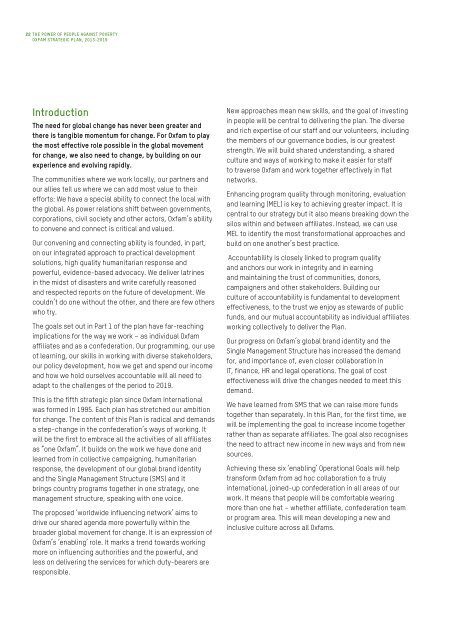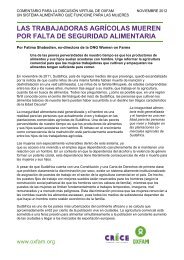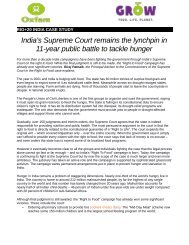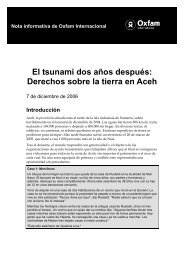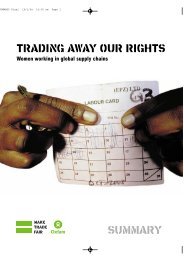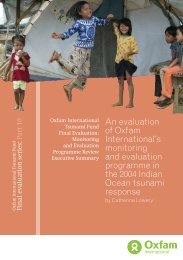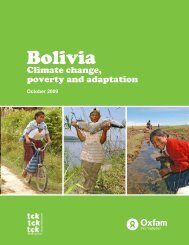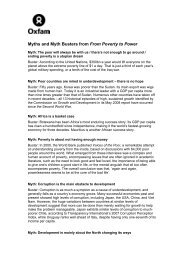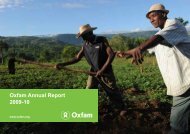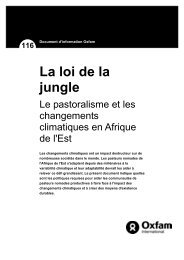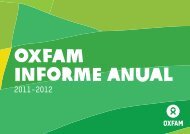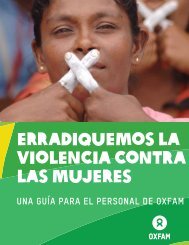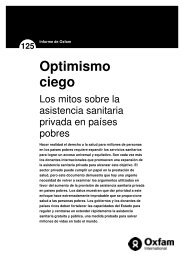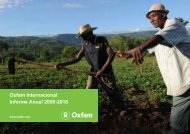Oxfam Strategic Plan, 2013-2019 - Oxfam International
Oxfam Strategic Plan, 2013-2019 - Oxfam International
Oxfam Strategic Plan, 2013-2019 - Oxfam International
You also want an ePaper? Increase the reach of your titles
YUMPU automatically turns print PDFs into web optimized ePapers that Google loves.
22 THE POWER OF PEOPLE AGAINST POVERTY<br />
OXFAM STRATEGIC PLAN, <strong>2013</strong>-<strong>2019</strong><br />
Introduction<br />
The need for global change has never been greater and<br />
there is tangible momentum for change. For <strong>Oxfam</strong> to play<br />
the most effective role possible in the global movement<br />
for change, we also need to change, by building on our<br />
experience and evolving rapidly.<br />
The communities where we work locally, our partners and<br />
our allies tell us where we can add most value to their<br />
efforts: We have a special ability to connect the local with<br />
the global. As power relations shift between governments,<br />
corporations, civil society and other actors, <strong>Oxfam</strong>’s ability<br />
to convene and connect is critical and valued.<br />
Our convening and connecting ability is founded, in part,<br />
on our integrated approach to practical development<br />
solutions, high quality humanitarian response and<br />
powerful, evidence-based advocacy. We deliver latrines<br />
in the midst of disasters and write carefully reasoned<br />
and respected reports on the future of development. We<br />
couldn’t do one without the other, and there are few others<br />
who try.<br />
The goals set out in Part 1 of the plan have far-reaching<br />
implications for the way we work – as individual <strong>Oxfam</strong><br />
affiliates and as a confederation. Our programming, our use<br />
of learning, our skills in working with diverse stakeholders,<br />
our policy development, how we get and spend our income<br />
and how we hold ourselves accountable will all need to<br />
adapt to the challenges of the period to <strong>2019</strong>.<br />
This is the fifth strategic plan since <strong>Oxfam</strong> <strong>International</strong><br />
was formed in 1995. Each plan has stretched our ambition<br />
for change. The content of this <strong>Plan</strong> is radical and demands<br />
a step-change in the confederation’s ways of working. It<br />
will be the first to embrace all the activities of all affiliates<br />
as “one <strong>Oxfam</strong>”. It builds on the work we have done and<br />
learned from in collective campaigning, humanitarian<br />
response, the development of our global brand identity<br />
and the Single Management Structure (SMS) and it<br />
brings country programs together in one strategy, one<br />
management structure, speaking with one voice.<br />
The proposed ‘worldwide influencing network’ aims to<br />
drive our shared agenda more powerfully within the<br />
broader global movement for change. It is an expression of<br />
<strong>Oxfam</strong>’s ‘enabling’ role. It marks a trend towards working<br />
more on influencing authorities and the powerful, and<br />
less on delivering the services for which duty-bearers are<br />
responsible.<br />
New approaches mean new skills, and the goal of investing<br />
in people will be central to delivering the plan. The diverse<br />
and rich expertise of our staff and our volunteers, including<br />
the members of our governance bodies, is our greatest<br />
strength. We will build shared understanding, a shared<br />
culture and ways of working to make it easier for staff<br />
to traverse <strong>Oxfam</strong> and work together effectively in flat<br />
networks.<br />
Enhancing program quality through monitoring, evaluation<br />
and learning (MEL) is key to achieving greater impact. It is<br />
central to our strategy but it also means breaking down the<br />
silos within and between affiliates. Instead, we can use<br />
MEL to identify the most transformational approaches and<br />
build on one another’s best practice.<br />
Accountability is closely linked to program quality<br />
and anchors our work in integrity and in earning<br />
and maintaining the trust of communities, donors,<br />
campaigners and other stakeholders. Building our<br />
culture of accountability is fundamental to development<br />
effectiveness, to the trust we enjoy as stewards of public<br />
funds, and our mutual accountability as individual affiliates<br />
working collectively to deliver the <strong>Plan</strong>.<br />
Our progress on <strong>Oxfam</strong>’s global brand identity and the<br />
Single Management Structure has increased the demand<br />
for, and importance of, even closer collaboration in<br />
IT, finance, HR and legal operations. The goal of cost<br />
effectiveness will drive the changes needed to meet this<br />
demand.<br />
We have learned from SMS that we can raise more funds<br />
together than separately. In this <strong>Plan</strong>, for the first time, we<br />
will be implementing the goal to increase income together<br />
rather than as separate affiliates. The goal also recognises<br />
the need to attract new income in new ways and from new<br />
sources.<br />
Achieving these six ‘enabling’ Operational Goals will help<br />
transform <strong>Oxfam</strong> from ad hoc collaboration to a truly<br />
international, joined-up confederation in all areas of our<br />
work. It means that people will be comfortable wearing<br />
more than one hat – whether affiliate, confederation team<br />
or program area. This will mean developing a new and<br />
inclusive culture across all <strong>Oxfam</strong>s.


